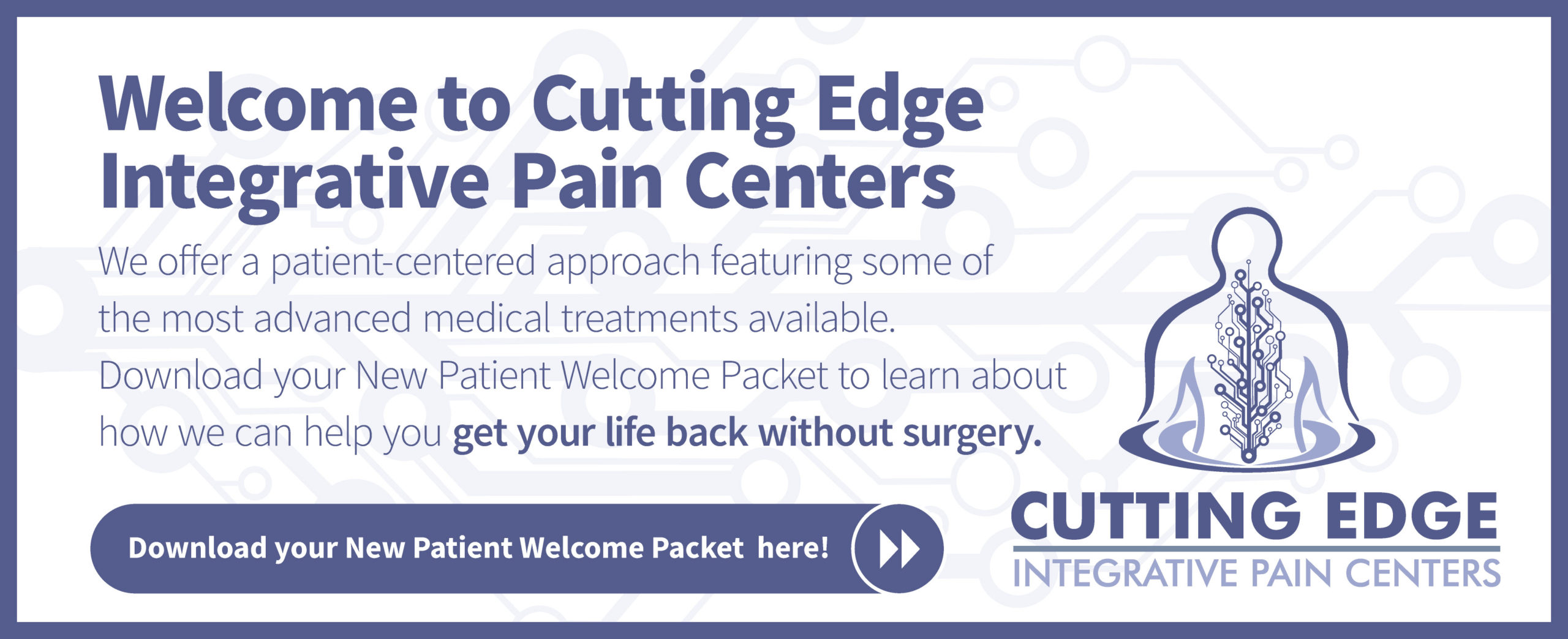Ketamine Infusion Therapy
Chronic Pain and Mental Health Relief Without Surgery.Finding Relief When Other Treatments Fail
For those struggling with mental illness or chronic pain finding a treatment that works is not always easy. Ketamine infusion therapy offers relief for those who have been unsuccessful with past treatments. We offer cutting-edge methods of treatment that have led to remarkable results.
Ketamine infusion therapy is revolutionary. It can significantly and rapidly reduce the symptoms of depression and chronic pain in 70% of patients. Most patients can even feel the effects after just one treatment. Cutting Edge Integrative Center believes that ketamine infusion therapy is a safe and effective option for our patients suffering from mental illness and chronic pain.

Mental Health Issues Treated
Treatment-Resistant Depression
Obsessive-Compulsive Disorder
Post Traumatic Stress Disorder
Panic Disorders
Anxiety
Alcohol Disorders
Neuropathic & Chronic Pain Treated
Neuropathic Pain
Peripheral Nerve Injury Pain
Complex Regional Pain Syndrome
Chronic Pain
Fibromyalgia
Migraine Headaches
Pricing
$450 for each mental health infusion = $2,700 total
Six infusions, three times a week, for two weeks
$1500 for a 4-hour pain infusion = 7500 total
1 mg/kg/hr. over 4 hours for 5 days
Financing Available
Schedule Your Ketamine Therapy Session Today!
Fill out the form below and someone from our team will contact you to schedule your session.
Frequently Asked Questions
What mental illnesses can ketamine infusion therapy treat?
Ketamine infusion therapy can treat depression, suicidal thoughts, PTSD, anxiety, OCD, panic disorders, and alcohol disorders.
Are there different types of ketamine?
There are two main kinds of ketamine used for ketamine infusion therapy:
- Racemic ketamine is used for infusion treatments.
- Esketamine (Spravato) is given as a nasal spray.
What physical pains can ketamine infusion therapy treat?
Ketamine infusion therapy can treat chronic pain caused by neuropathic pain, trigeminal neuralgia, complex regional pain syndrome, phantom limb pain, fibromyalgia, and peripheral nerve injury pain, and chemotherapy-induced pain.
How long does ketamine infusion therapy last?
Treatment time can take anywhere from an hour to a few hours depending on the severity of the pain. The patient should also be prepared to wait for 30 minutes after the infusion is over to leave. Multiple infusions over several weeks are needed to feel the full effect of the treatment.
How soon will I feel the effects of the treatment?
Most patients can feel a difference after only 1-3 visits.
Are there side effects to ketamine infusions?
There are a few mild side effects that patients may experience during or after the infusion. The most common side effects include high blood pressure, nausea, perceptual disturbances, and/or dissociation.
Is the dosage used during ketamine infusion therapy the same as what is used for anesthesia?
No, the dosage used for ketamine infusion therapy is much lower than what is used for anesthesia during surgery.
What is the success rate of ketamine infusion therapy?
70% of patients see results from the treatments, most often after just 1-3 sessions.
How does ketamine infusion therapy work?
Ketamine infusion therapy works by “rewiring” the brain to create better and stronger neurons. These neurons create more positive thoughts and block pain receptors from firing.
Is there a potential to become addicted to ketamine during treatment?
While ketamine has been used as a party drug and can be addictive when taken in large quantities, the dosage during ketamine infusion therapy is very low so there is virtually no potential of becoming addicted.
Is ketamine infusion therapy FDA approved?
While ketamine is FDA-approved for use as anesthesia, it is not yet been approved for treating mental illness and chronic pain. Research and clinical results have shown the overwhelmingly positive effects of ketamine for mental illness and chronic pain though.
Can I use my insurance to help pay for ketamine infusion therapy?
Since ketamine infusion therapy has not been FDA approved for use as a treatment for mental illness and chronic pain, most insurance companies will not cover the costs of treatment.
How much does it cost?
$450 for each mental health infusion = $2,700 total; six infusions, three times a week, for two weeks.
$1500 for a 4-hour pain infusion = $7,500 total; 1 mg/kg/hr over 4 hours for 5 days
About the Doctor
Orlando A. Landrum MD, MBA
Regenerative Medicine and Interventional Pain Specialist
Our Location
Elkhart, IN
3060 Windsor Court

